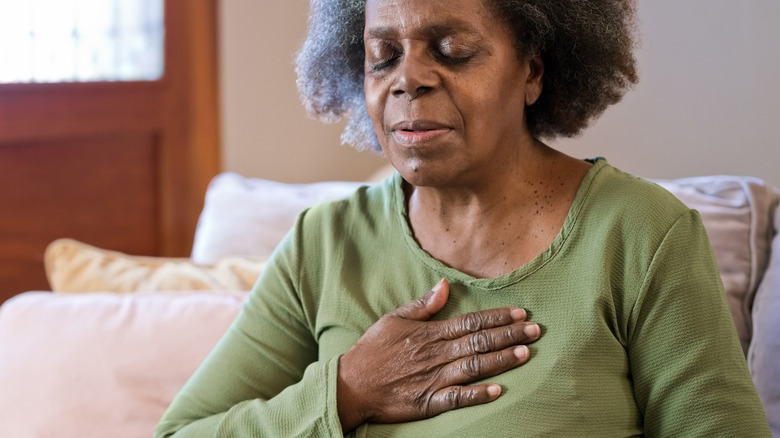Signs Your Stomach Pain Is Actually A Heart Attack
A big dinner with friends can spark good times, but overindulging in a little more food and alcohol than you're used to might make your stomach feel a little sick. You might know how your body responds after a heavy meal, but stomach pain could result from other factors. After all, you have plenty of organs in your abdomen that can leave you doubled up on the couch.
Stomach pain can feel like a dull ache or a sharp pain. You could feel worse when you lie down, or your stomach could ache all the time. Stomach pain might be felt on one side of your abdomen, or your entire abdominal region could feel achy. Your stomach is located in the upper part of your abdomen on the left, so some conditions, like a stomach ulcer, could be the reason for your pain.
Sometimes your stomach pain might feel like a burning in your chest. If you've just eaten a heavy meal, you could have indigestion. However, it could also be a warning sign of a heart attack. Although many people having a heart attack might feel a tight or painful chest, some might feel like they have heartburn or indigestion (per National Health Service).
Distinguishing indigestion from a heart attack
It might not make sense that your stomach pain is a heart attack, even though indigestion or acid reflux is also called heartburn. You sometimes feel pain in your chest during indigestion because the acid from your stomach moves up into your esophagus, which is just under your breastbone. Your pain from heartburn could be a heart attack if you feel pain in your neck, jaw, back, or one of your arms. You might also experience shortness of breath, nausea, lightheadedness, or cold sweats. While chest pain is a common symptom of a heart attack, not everyone feels chest pain, particularly women (per the American Heart Association).
On the other hand, indigestion isn't felt in your arms, neck, or back, and you might feel a burning sensation in your throat. Indigestion also feels worse if you lie down. A stomach ache, acid reflux, or indigestion often follows eating a heavy meal or certain foods like garlic, onion, chocolate, or mint. Alcohol can also stir up indigestion.
Preventing a heart attack
Even if your stomach pain is simply indigestion, you can take measures now to prevent a future heart attack. While foods that cause indigestion don't necessarily contribute to a heart attack, foods high in saturated fat can raise artery-clogging LDL cholesterol. These are foods such as high-fat cuts of meat, cakes, butter, hard cheese, and anything fried. To keep your heart healthy, it's best to stick with olive oil rather than butter or cheese in your foods. You'll also improve your heart health by eating whole-grain bread, fruit, vegetables, and fish.
A low-sodium, low-fat diet that's high in fiber will also reduce your blood pressure. High blood pressure can increase your risk of a heart attack. Drinking alcohol regularly can increase your blood pressure, so women should drink no more than one alcoholic drink per day. Men should limit themselves to two drinks a day. Carrying too much weight on your body also forces your heart to work harder. Even if you have a healthy BMI, the American Heart Association says carrying fat around your waistline increases your risk for heart disease. A regular exercise program will help you manage your weight while also keeping your heart healthy.



